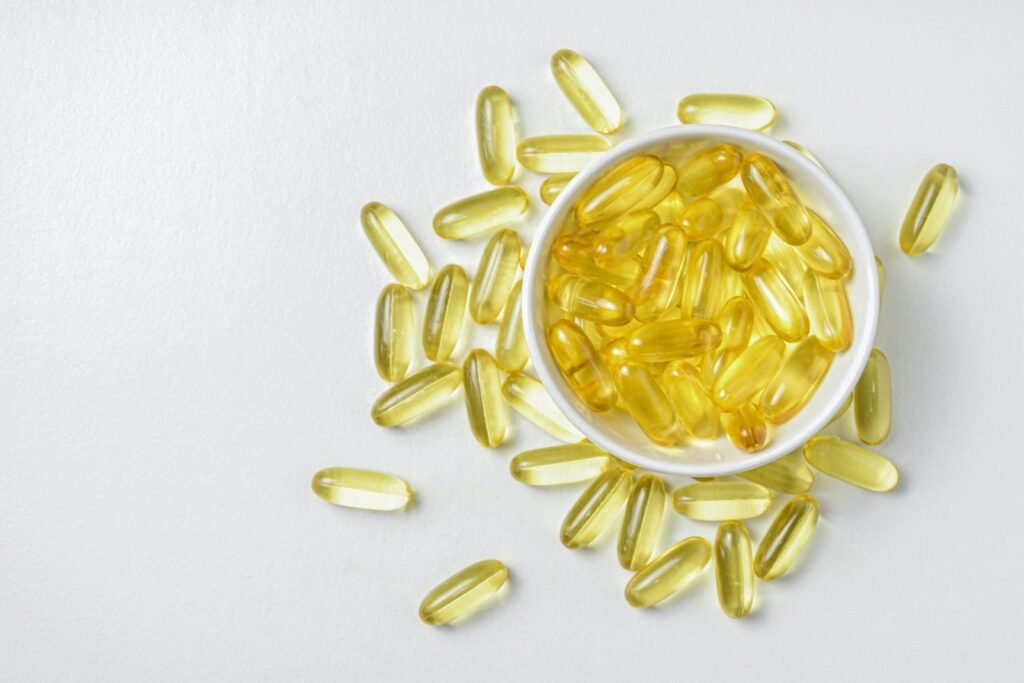Can You Take Vitamin D with Coffee? (2024 Timing Guide)

Many people wonder if it’s okay to have vitamin D with coffee. It’s a popular question and makes us curious. Coffee and tea are important parts of our daily routine, so we want to know if they can affect the supplements we take.
Let’s explore the question, Can you have vitamin D with coffee?
In short, I recommend you NOT take Vitamin D with coffee.
Here’s why:
Less Absorption: Research suggests that the caffeine in coffee may reduce the amount of Vitamin D absorbed by your body.
So if you take them together, you may reduce the overall benefit of taking your Vitamin D supplement.
Here’s your action plan:
- Take time in between: Wait at least an hour after your coffee before taking your Vitamin D supplement.
- Take apart: You may want to take your Vitamin D before bed or in the morning before you have coffee.
We’ll learn about what is caffeine. Find out which supplements you shouldn’t mix with coffee, and discover the best ways to add vitamins to your tea and coffee routine.
Get ready to uncover the secrets of balancing caffeine and important nutrients in your everyday routine!
How Does Caffeine Work?
Caffeine is a natural stimulant found in various plants, including coffee beans, tea leaves, and cacao beans. Its primary mode of action is by blocking the action of a neurotransmitter called adenosine. Here’s a breakdown of how caffeine works:
- Adenosine and Sleep Regulation: Adenosine is a neurotransmitter that promotes sleep and relaxation. Throughout the day, adenosine levels in your brain gradually increase, making you feel increasingly tired. When you sleep, adenosine levels drop, and you wake up feeling refreshed.
- Caffeine as an Adenosine Antagonist: Caffeine is structurally similar to adenosine, allowing it to bind to adenosine receptors in the brain. However, instead of promoting sleep and relaxation, caffeine blocks these receptors. As a result, adenosine’s calming effects are inhibited, making you feel more awake and alert.
- Increased Neurotransmitters: When adenosine receptors are blocked by caffeine, the release of other neurotransmitters like dopamine and norepinephrine increases. These neurotransmitters play a crucial role in mood regulation, focus, and overall alertness.
- Vasoconstriction: Caffeine also has vasoconstrictive properties, meaning it narrows your blood vessels. This effect can lead to increased blood pressure and improved circulation, contributing to the feeling of alertness.

Effects of Caffeine on the Body
Now that we understand how caffeine works on a neurological level, let’s explore the various effects it has on the body:
- Increased Alertness: The most well-known effect of caffeine is increased alertness and reduced feelings of fatigue. This is why many people turn to caffeine to combat morning grogginess or midday slumps.
- Enhanced Concentration: Caffeine can improve concentration and cognitive function, making it a popular choice for students and professionals seeking to boost their productivity.
- Elevated Mood: The release of dopamine triggered by caffeine can create a sense of well-being and improved mood.
- Increased Heart Rate: Caffeine’s vasoconstrictive properties can lead to a temporary increase in heart rate and blood pressure. While this is usually harmless for most people, those with heart conditions should consume caffeine in moderation.
- Improved Physical Performance: By stimulating the release of adrenaline, which can increase strength and endurance, caffeine has been demonstrated to improve physical performance.
- Diuretic Effect: Caffeine acts as a diuretic, meaning it can increase urine production. This effect can lead to increased fluid loss, so it’s essential to stay hydrated when consuming caffeine.
- Potential for Dependence: Regular consumption of caffeine can lead to tolerance, where you may need more caffeine to achieve the same effects. Abruptly stopping caffeine intake can result in withdrawal symptoms, including headaches and fatigue.
Thanks to betterhealthvic.gov.au for the detailed information on the Effects of Caffeine on the Body
Vitamin D Absorption
Vitamin D is a vital nutrient that plays a crucial role in various bodily functions, including bone health, immune system support, and mood regulation.
To reap the full benefits of vitamin D, it’s essential to understand the factors that affect its absorption. Vitamin D absorption primarily takes place in the small intestine. Here’s a simplified breakdown of the process:
- Dietary Sources: Dietary sources of vitamin D include fatty fish, egg yolks, and fortified products like milk and cereals. However, most people acquire the majority of their vitamin D through exposure to sunlight, as the skin synthesizes vitamin D when exposed to UVB rays.
- Digestion and Absorption: After consumption, dietary vitamin D produces micelles after being integrated into dietary lipids. Following absorption through the intestinal lining, these micelles reach the circulation.
- Liver and Kidneys: The liver is where vitamin D is transformed into its active form, calcitriol. The kidneys further process calcitriol, making it biologically active and ready for use by the body.
Factors Affecting Absorption of Vitamins and Minerals
The absorption of vitamins and minerals, including vitamin D, can be influenced by several factors:
- Nutrient-Nutrient Interactions: Some vitamins and minerals can enhance or inhibit each other’s absorption. For example, vitamin D and calcium work synergistically to support bone health, while excessive calcium intake can hinder the absorption of other minerals like iron and magnesium.
- Dietary Factors: A balanced diet with a variety of foods promotes better nutrient absorption. Fiber, for instance, can slow down the absorption of certain minerals, while a diet rich in antioxidants can support overall nutrient uptake.
- Gut Health: A healthy digestive system is crucial for nutrient absorption. Conditions like celiac disease or Crohn’s disease can impair the absorption of various nutrients.
- Medications: Some medications, such as proton pump inhibitors (PPIs) and antacids, can affect the absorption of certain vitamins and minerals. It’s important to consult with a healthcare professional if you’re on long-term medication.
- Age: Aging can impact nutrient absorption, as the body’s efficiency in absorbing certain vitamins and minerals may decrease with age. This underscores the importance of a balanced diet and potentially supplementing with vitamins like B12 and D.

Does Caffeine Affect the Absorption of Vitamins?
Now, let’s address the question of whether caffeine affects the absorption of vitamins. It is not known that caffeine, which is frequently present in coffee, tea, and energy beverages, significantly affects the absorption of vitamins.
While Caffeine can have mild diuretic effects, causing increased urine production, these effects are unlikely to interfere with the absorption of vitamins and minerals.
However, it’s worth noting that excessive caffeine intake, especially in the form of energy drinks or supplements, can disrupt sleep patterns and overall health.
Poor sleep and stress can indirectly affect nutrient absorption, so maintaining a balanced caffeine intake is advisable.
Interactions Between Coffee and Vitamin D
Potential Effects of Coffee on Vitamin D Levels
- Caffeine Content: Coffee is well-known for its caffeine content. In moderation, caffeine is not thought to have a substantial impact on vitamin D absorption. However, excessive caffeine intake could potentially lead to increased urination, which might result in the loss of water-soluble vitamins, including vitamin D. It’s essential to maintain a balanced coffee consumption to avoid any negative effects on vitamin D levels.
- Calcium Binding: Coffee contains compounds known as tannins that can bind to minerals, including calcium. While this effect is more pronounced with tea, it may also exist to some extent in coffee. However, vitamin D primarily aids in calcium absorption, so unless you consume a very excessive amount of coffee, the impact on your overall vitamin D status is likely minimal.
- Time of Consumption: Some studies suggest that consuming coffee and other caffeinated beverages alongside vitamin D-rich meals may hinder calcium absorption, indirectly affecting vitamin D utilization. Researchers disagree about this effect’s practical importance, nevertheless.
Other Factors that Affect Vitamin D Absorption
Besides coffee, several other factors can influence how your body absorbs and utilizes vitamin D:
- Sunlight Exposure: The term “sunshine vitamin” refers to vitamin D, which your skin may produce when exposed to sunlight. Spending time outdoors and getting sunlight on your skin is one of the most effective ways to boost your vitamin D levels naturally.
- Dietary Choices: Consuming foods rich in vitamin D, such as fatty fish (salmon, mackerel), egg yolks, and fortified dairy products, can contribute to your vitamin D intake.
- Gut Health: Conditions that affect the gut, such as celiac disease or Crohn’s disease, can hinder the absorption of vitamin D and other nutrients. A healthy gut is crucial for optimal nutrient absorption.
- Medications: Certain medications, like weight-loss drugs or antiepileptic drugs, can interfere with vitamin D metabolism. Consult with your healthcare provider if you’re on long-term medication and concerned about vitamin D levels.
- Age and Genetics: Age and genetics can influence how efficiently your body absorbs and utilizes vitamin D. Older individuals may have reduced skin synthesis of vitamin D, making supplementation or dietary sources more important.
Best Time to Take Vitamins
The ideal time to take vitamins depends on the type of vitamin. Anywho I will quickly summarize it:
- Morning: Water-soluble vitamins (B complex, C) if tolerated well on an empty stomach, otherwise with breakfast. Consider taking B12 in the morning for its potential energy boost.
- With a meal: Multivitamins (usually contain both fat and water-soluble types) or fat-soluble vitamins (A, D, E, K).
Remember: Consistency is key! It’s more important to take your vitamins regularly than exactly when you take them.
Best Time to Take Vitamins: Timing Considerations
- Vitamin C: Water-soluble vitamin C can be consumed at any time of the day. However, some people prefer to take it in the morning to boost their immune system and energy levels.
- Vitamin D: Because it controls circadian rhythms and sleep, vitamin D is frequently advised in the morning. Taking it in the morning can help support your body’s natural wakefulness.
- Vitamin B Complex: The ideal time to take B vitamins is often in the morning or with breakfast. They can provide an energy boost and support cognitive function throughout the day.
- Vitamin A: When consumed with a meal that contains healthy fats, fat-soluble vitamins like vitamin A are more readily absorbed. So, it’s advisable to take vitamin A with breakfast or lunch.
- Vitamin E: Similar to vitamin A, vitamin E is a fat-soluble vitamin, and for best absorption, it should be taken with a meal that contains some dietary fat.
- Iron: To improve absorption, iron supplements are often taken first thing in the morning on an empty stomach.
However, they can cause stomach upset in some individuals, so it’s essential to follow your healthcare provider’s recommendations. - Calcium: It is better to take calcium supplements with meals. To increase absorption, they can be split into many doses spread out throughout the day.
- Multivitamins: Multivitamins often contain a combination of vitamins and minerals. Although it is best to abide by the precise directions on the label, they are normally taken with meals to improve absorption and lower the chance of gastrointestinal distress.
Activeiron.com is the Perfect source for the Best Time to Take Vitamins.
Can Vitamin D Be Taken with Coffee?
It’s best to avoid taking Vitamin D with coffee. While research isn’t conclusive,
here’s the concern:
Less Absorption: Some studies indicate that the caffeine in coffee may decrease your body’s ability to absorb it. That would mean potentially less benefit from your supplement.
Here are some options to take Vitamin D with Coffee:
- Space them out: Leave at least an hour between your coffee and Vitamin D intake.
- Take them separately: Consider taking Vitamin D before bed or in the morning before your coffee.
Overall, consult your doctor for personalized advice. They can consider your individual needs and any medications you’re taking to determine the best approach for maximizing your Vitamin D absorption.

Frequently Asked Questions about Can you take Vitamin D with coffee
Can we drink tea and coffee if we are taking vitamin D powder?
While you can technically drink tea and coffee with vitamin D powder, it’s generally recommended not to take them at the same time.
Here’s why:
- Reduced Absorption: Caffeine in both coffee and tea might hinder vitamin D absorption by your body. This means you might not get the full benefits of your vitamin D supplement.
Here are some tips for maximizing your vitamin D intake:
- Space them out: Leave at least an hour between your coffee or tea and taking your vitamin D powder.
- Take it separately: Consider taking your vitamin D powder before bed or in the morning before your first cup of coffee or tea.
Important Note:
- Consult your doctor: They can consider your individual needs and any medications you’re taking to determine the best approach for maximizing your Vitamin D absorption.
Overall, enjoying your tea or coffee is fine, but separating it from your vitamin D powder by an hour or so can help ensure your body absorbs the vitamin D effectively.
How long after drinking coffee can I take vitamin D?
Research suggests waiting for at least one hour after drinking coffee before taking your vitamin D supplement to maximize absorption.pen_spark
Is vitamin D affected by caffeine?
Yes, caffeine may potentially affect vitamin D absorption in a couple of ways:
- Reduced Receptor Activity: Some studies suggest caffeine might interfere with vitamin D receptor activity in the body. These receptors are essential for your cells to absorb and utilize vitamin D.
- Diuretic Effect: Caffeine acts as a diuretic, increasing urination. This can lead to increased excretion of water-soluble vitamins, potentially including a small amount of vitamin D.
Can I have coffee after taking Vitamin D3?
Yes! You can technically have coffee after taking Vitamin D3, but for optimal absorption, it’s generally recommended to wait a while. Due to the Potential Impact of Caffeine.
What should you avoid when taking vitamin D3?
Here are some things to avoid when taking vitamin D3 to optimize its effectiveness and avoid potential side effects:
1. Taking it with coffee or tea: While not entirely forbidden, caffeine in coffee and tea might slightly hinder vitamin D absorption. To maximize absorption, space out your coffee or tea intake by at least an hour from taking your vitamin D3 supplement.
2. Taking too much vitamin D3: Vitamin D3 is fat-soluble and can accumulate in the body. Excessive intake can lead to vitamin D toxicity, causing symptoms like nausea, vomiting, fatigue, and kidney problems. Stick to the recommended dosage based on your age and health status, and consult your doctor before exceeding recommended amounts.
3. Taking it with certain medications: Some medications can interact with vitamin D3. For example, medications like corticosteroids, diuretics, and some cholesterol medications can affect vitamin D metabolism. Discuss your vitamin D supplementation with your doctor, especially if you’re already on any medications.
4. Skipping meals when taking a fat-soluble supplement: Vitamin D3 is a fat-soluble vitamin. Taking it with a meal containing healthy fats like avocado, nuts, or olive oil can improve its absorption.
5. Not getting enough sunlight: While vitamin D3 supplements are helpful, your body can also naturally produce vitamin D with sufficient sunlight exposure. Aim for moderate sun exposure (without burning) on your arms and legs for 15-20 minutes a few times a week, depending on your skin tone and location.
6. Ignoring potential deficiencies: Certain health conditions or medications can hinder vitamin D absorption. If you suspect a vitamin D deficiency, consult your doctor for a blood test to determine the appropriate dosage for your needs.
By following these tips, you can ensure safe and effective vitamin D3 supplementation. Remember, consulting your doctor for personalized advice based on your health history and needs is always recommended.

Conclusion
In conclusion, the question of whether you can take vitamin D with coffee often arises due to concerns about caffeine and its potential impact on nutrient absorption. Fortunately, research suggests that caffeine found in coffee or tea does not significantly hinder the absorption of vitamin D or most other vitamins and minerals. Therefore, taking vitamin D with your morning coffee or tea is generally safe and unlikely to result in negative interactions.
However, while caffeine may not pose a significant concern for vitamin D, there are certain supplements you should never take with coffee. To maximize the benefits of taking vitamins and supplements, consider the timing of your caffeine intake and the specific requirements of each supplement.
Always consult with a healthcare professional for personalized advice on taking vitamins, especially if you have specific health concerns or are taking multiple supplements.
In most cases, a balanced approach to nutrition, including a diverse diet and responsible caffeine consumption, can support your overall well-being without compromising the effectiveness of your supplements.



